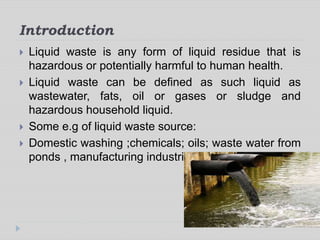Getting The Reclaim Waste To Work
Getting The Reclaim Waste To Work
Blog Article
Indicators on Reclaim Waste You Should Know
Table of ContentsThe Main Principles Of Reclaim Waste The Main Principles Of Reclaim Waste 10 Easy Facts About Reclaim Waste DescribedGetting The Reclaim Waste To WorkThe Main Principles Of Reclaim Waste
Check out the kinds, incidents, and types of liquid waste. Residential sewage waste describes the waste and products from a residential septic system. This sort of waste is developed by people in residences, institutions, and various other buildings. This only consists of septic tanks that have a drainpipe field. The proper management and disposal of residential sewer waste require fluid waste to be transferred to a sewer therapy plant where the appropriate approaches and devices are put on purify and deal with waste.
Commercial waste typically includes prospective hazards, such as flammable products or a mixture of liquid and solid waste items, and calls for a much more innovative and detailed disposal procedure. The disposal of commercial waste normally includes the purification of waste before transportation to ensure safe and proper disposal. Industrial waste is produced from results and runoff of industrial procedures and manufacturing.
This kind of waste can not use the exact same sewage administration transport or procedures as septic or industrial fluids. The commercial waste monitoring process needs the examination and screening of fluid waste prior to it undertakes the disposal procedure (industrial wastewater treatment). Drainage waste is the fluid waste that comes from overflow and excess stormwater in extremely inhabited locations or cities
Runoff waste can trigger contamination and flooding if not dealt with correctly. Ensuring correct waste administration can avoid disasters and lower ecological harm.
The Definitive Guide for Reclaim Waste
Get in touch with PROS Providers today to discover concerning our waste management and disposal solutions and the proper methods to take care of the liquid waste you create.
(https://www.twitch.tv/reclaimwaste1/about)Do you recognize what occurs to your water when you disengage, flush the toilet or drain pipes the washing device? No? Well, it deserves recognizing. This so-called 'wastewater' is not only an important source but, after treatment, will be launched to our land, rivers or the sea. Made use of water from commodes, showers, baths, cooking area sinks, washings and industrial processes is called wastewater.

water used to cool down machinery or clean plant and tools). Stormwater, a type of wastewater, is browse around this web-site drainage that flows from farming and city areas such as roof coverings, parks, yards, roads, paths and seamless gutters right into stormwater drains pipes, after rainfall. Stormwater moves without treatment directly to regional creeks or rivers, ultimately getting to the ocean.
The Basic Principles Of Reclaim Waste
In Queensland, most wastewater is treated at sewage therapy plants. Wastewater is transferred from domestic or industrial websites via a system of sewage systems and pump terminals, referred to as sewerage reticulation, to a sewage treatment plant. Regional governments develop, preserve and operate most sewer therapy plants. Operators are accredited under the Environmental Management Act 1994 to release treated wastewater at an acceptable ecological criterion right into rivers.
The Department of Natural Resources advises regional federal governments regarding managing, operating and keeping sewerage systems and treatment plants. In unsewered locations, city governments might need householders to set up private or household sewer treatment systems to treat residential wastewater from bathrooms, cooking areas, washrooms and laundries. The Department of Natural Resources authorizes making use of home systems when they are proven to be reliable.
The majority of stormwater gets no treatment. In some new subdivisions, treatment of some stormwater to get rid of trash, sand and gravel has actually begun utilizing gross pollutant catches. Wastewater treatment takes place in 4 stages: Gets rid of solid matter. Bigger solids, such as plastics and other things incorrectly discharged to drains, are removed when wastewater is passed with screens.
Utilizes little living organisms understands as micro-organisms to break down and get rid of remaining dissolved wastes and fine bits. Micro-organisms and wastes are incorporated in the sludge.
The 7-Second Trick For Reclaim Waste
Nutrient elimination is not offered at all sewage treatment plants due to the fact that it requires pricey specialized devices. Clear liquid effluent generated after therapy may still contain disease-causing micro-organisms - liquid waste removal melbourne.

Many wastewater moves into the sewage system. Under the Act, regional governments provide authorizations and licences for environmentally pertinent activities (Ages) involving wastewater launches that could have a regional influence.
The Definitive Guide for Reclaim Waste
Or else, samples are taken for lab evaluation. Typically several tests are needed to establish the degrees of each of the various pollutants such as oils, heavy metals and chemicals in water. Surveillance gives factual info concerning water top quality and can validate that licence conditions are being fulfilled. The details gotten through tracking supplies the basis for making water top quality decisions.
Report this page